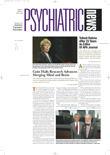Children who witness domestic violence are especially vulnerable to a wide range of developmental and psychiatric problems as they grow older, according to Graeme Hanson, M.D., a clinical professor of psychiatry and pediatrics and director of residency training in child and adolescent psychiatry at the University of California, San Francisco (UCSF).
“Domestic violence has significant negative effects on children's emotional, cognitive, social, and behavioral development,” Hanson told attendees at APA's annual meeting in New York City last month.
As many as 10 million children a year are exposed to domestic violence, Hanson said. Children who witness domestic violence may have twice the rate of psychiatric disorders as those who do not witness violence in the home, he added.
The multitude of mental health and developmental problems arising from witnessing domestic violence includes increased aggression, phobias, insomnia, poor self-esteem, poor academic performance, and decreased problem-solving skills, Hanson said.
With prolonged exposure to violence at home, children can also develop symptoms related to posttraumatic stress disorder, such as emotional numbing, avoidance of reminders of the abuse, and obsessing about a violent event.
Children who witness domestic violence are often caught in a bind, Hanson explained. “They may be terrified at what they see, but the very person to whom the child would turn—the mother—is often emotionally unavailable because she is trying to deal with the abuse,” he said.
Hanson pointed out that studies by Alicia Lieberman, Ph.D., a child-development specialist and an associate professor of psychology at UCSF, show that children who witness violence in their home express a great deal of anger at their abused mothers. Identifying with the abuser is a common defense mechanism in children who are either abused or who witness abuse at home.
In families in which abusive fathers have been taken into custody, children may idealize them or “miss the good parts of dad,” Hanson noted. The fact that the father has been removed from the home may also spark fear in children that their mother will soon be gone as well. “As a result, these children are at increased risk for separation anxiety.”
Lieberman has studied and implemented a therapy that aims to resolve conflicts in the parent-child relationship and create a setting in which the mother is better able to facilitate the child's development, Hanson noted. Lieberman studied 45 mother-child pairs in which mothers had severed their relationship with the abusers. The intervention lasted once a week for one year, and Lieberman found that 60 percent of the children had increases in IQ scores and a reduction in PTSD symptoms, among other evidence of improvement, Hanson said. ▪
